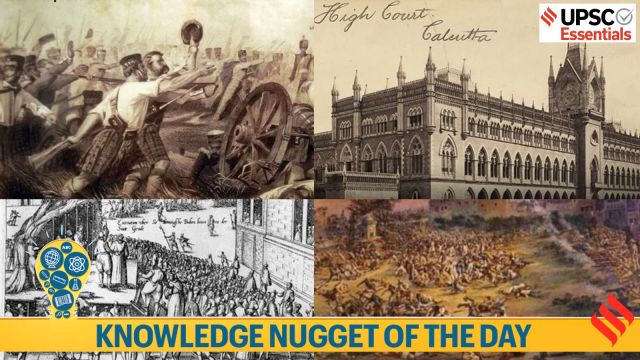Take a look at the essential events, concepts, terms, quotes, or phenomena every day and brush up your knowledge. Here’s your knowledge nugget for today.
Knowledge Nugget: Dramatic Performances Act and other British-era laws
Subject: History
(Relevance: Colonial laws are a crucial part of the modern history syllabus for UPSC CSE. Additionally, the UPSC has previously asked questions regarding various colonial acts. Therefore, understanding the colonial-era laws, especially those that have been in the news for specific reasons, is essential.)

Why in the news?
Prime Minister Narendra Modi on Saturday (March 1) said his government has abolished approximately 1,500 obsolete laws, many of which were enacted during the British rule. He highlighted the “Dramatic Performance Act,” which was established by the British around 150 years ago to prevent the use of drama and theatre against the government of that time. In this context, let’s know some of the colonial-era laws that were considered draconian. But first let’s understand the Dramatic Performance Act.
Story continues below this ad
Key Takeaways :
1. In the 18th century, India used theatre as a weapon to exhibit rebellion against the colonial rule. Threatened by revolutionary impulses, the British government introduced the Dramatic Performance Act in 1876.
2. The Dramatic Performances Act, 1876, gave the British government powers to prohibit “any play, pantomime or other drama performed or about to be performed in a public place” if the government was of the “opinion” that the play was “of a scandalous or defamatory nature”, was “likely to excite feelings of disaffection to the Government established by law”, or “to deprave and corrupt persons present at the performance”.
3. Under the Dramatic Performances Act, any Magistrate could warrant the search and seizure of “any house, room or place is used, or is about to be used, for any performance prohibited under this Act”. The law prescribed a jail term of up to three months and a fine or both.
4. On May 10, 1956, in a ruling titled State versus Baboo Lal And Ors, the Allahabad High Court ruled that the law was inconsistent with the Constitution of India. The law was formally repealed by Parliament through the Repealing and Amending (Second) Act, 2017.
Story continues below this ad
Criminal Tribes Act, 1871
1. The British, after constantly facing tribal revolts across the country, designated several communities as “criminal” through the Criminal Tribes Act, 1871.
2. This act allowed the British Raj to declare any community as a “criminal tribe” if they were deemed “addicted to systematic commission of non-bailable offences”. With this declaration, these tribes were forced to settle in designated locations, subjected to constant checks and the threat of arrest without a warrant, and more draconian restrictions “based on a stereotype which considered several marginalized communities as born criminals”.
3. After multiple amendments and iterations, the Act was repealed in 1952 and the former ‘criminal tribes’ became known as ‘denotified tribes’.
Vernacular Press Act, 1978
1. During the reign of the British Empire, several Acts were passed to impose strict restrictions on the Indian press. This was due to the fact that newspapers were playing a significant role in fostering a nationalistic rebellion through their words and symbols.
Story continues below this ad
2. The Vernacular Press Act was passed on March 14, 1878, where the British government claimed stronger control over the vernacular newspapers in the interest to curb “seditious writing” in “publications in oriental languages”. This Act was not imposed on English-language publications.
Rowlatt Act, 1919
1. In response to increasing anti-British conspiracies, the British government enacted the Anarchical and Revolutionary Crimes Act of 1919, commonly referred to as the Rowlatt Act. Passed on the recommendations of Sedition Committee chaired by Sir Sidney Rowlatt, this act aimed to suppress civil unrest and exert greater control over the Indians.
2. The law granted the British government the authority to arrest and detain any Indian citizen without trial for up to two years based solely on suspicions of terrorism. The introduction of this law faced widespread opposition throughout India. Gandhi had protested against this oppressive Act by calling people to launch a satyagraha against it.
BEYOND THE NUGGET: What does the Constitution say about colonial-era laws?
1. Article 372 of the Constitution of India states that laws in effect at the time of Independence will continue to remain in force. However, colonial laws do not have the same presumption of constitutionality. This means that when a colonial law is challenged, the government must justify its validity.
Story continues below this ad
2. In contrast, laws enacted by the Parliament of independent India are generally assumed to be constitutional unless proven otherwise. In such cases, the burden of proof lies with the petitioner, who must demonstrate that the legislation violates the Constitution.
Post Read Question
With reference to Rowlatt Satyagraha, which of the following statements is/are correct? (UPSC CSE 2015)
1. The Rowlatt Act was based on the recommendations of the ‘Sedition Committee’.
2. In Rowlatt Satyagraha, Gandhiji tried to utilize the Home Rule League.
Story continues below this ad
3. Demonstrations against the arrival of Simon Commission coincided with Rowlatt Satyagraha.
Select the correct answer using the code given below:
(a) 1 only
(b) 1 and 2 only
(c) 2 and 3 only
(d) 1, 2 and 3
Read More:
Modi questions ‘Khan Market gang’ silence on colonial-era drama law
What was the colonial-era Dramatic Performances Act, mentioned by PM Narendra Modi?
A pre-Independence history of press freedom in India
Why did Supreme Court strike down discriminatory rules across state prison manuals?

Story continues below this ad
🚨Your Feedback Matters: Click here to share your views on our UPSC Essentials Quiz. 🚨
🚨Union Budget 2025 special: Click Here to read the February 2025 issue of the UPSC Essentials monthly magazine. Share your views and suggestions in the comment box or at manas.srivastava@indianexpress.com🚨
Subscribe to our UPSC newsletter and stay updated with the news cues from the past week.
Stay updated with the latest UPSC articles by joining our Telegram channel – Indian Express UPSC Hub, and follow us on Instagram and X.



































